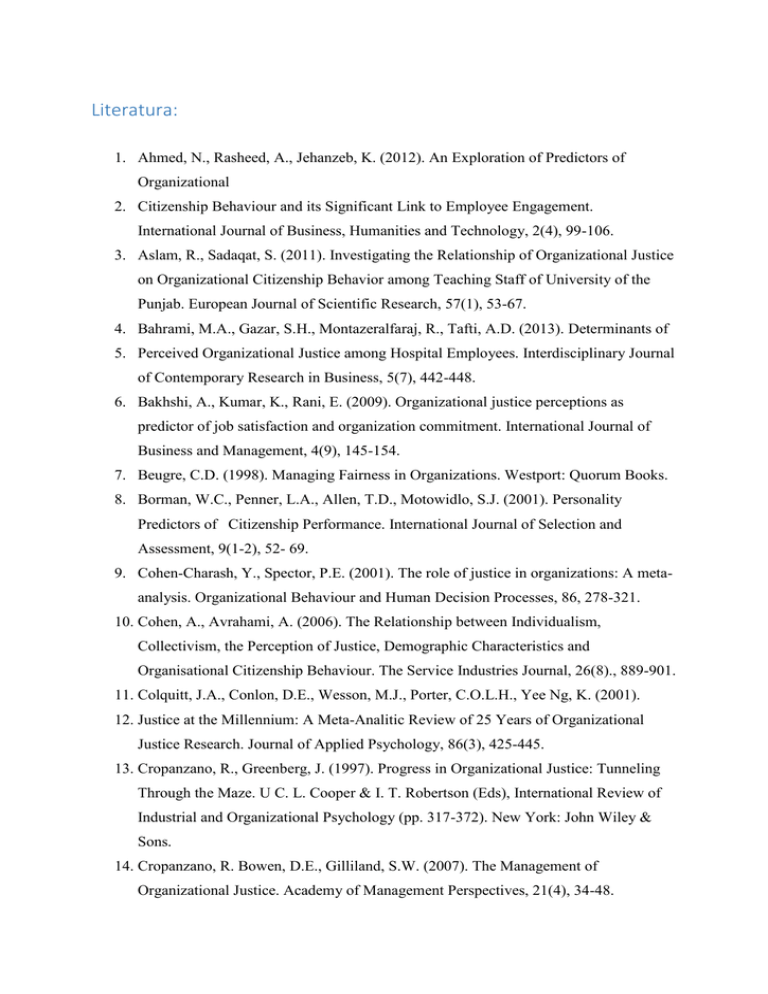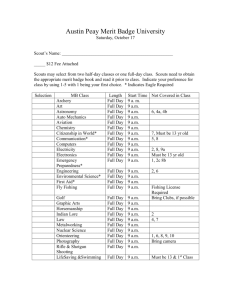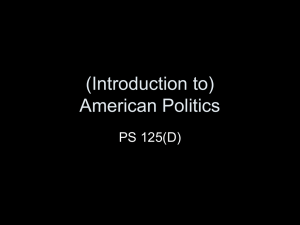Literatura
advertisement

Literatura: 1. Ahmed, N., Rasheed, A., Jehanzeb, K. (2012). An Exploration of Predictors of Organizational 2. Citizenship Behaviour and its Significant Link to Employee Engagement. International Journal of Business, Humanities and Technology, 2(4), 99-106. 3. Aslam, R., Sadaqat, S. (2011). Investigating the Relationship of Organizational Justice on Organizational Citizenship Behavior among Teaching Staff of University of the Punjab. European Journal of Scientific Research, 57(1), 53-67. 4. Bahrami, M.A., Gazar, S.H., Montazeralfaraj, R., Tafti, A.D. (2013). Determinants of 5. Perceived Organizational Justice among Hospital Employees. Interdisciplinary Journal of Contemporary Research in Business, 5(7), 442-448. 6. Bakhshi, A., Kumar, K., Rani, E. (2009). Organizational justice perceptions as predictor of job satisfaction and organization commitment. International Journal of Business and Management, 4(9), 145-154. 7. Beugre, C.D. (1998). Managing Fairness in Organizations. Westport: Quorum Books. 8. Borman, W.C., Penner, L.A., Allen, T.D., Motowidlo, S.J. (2001). Personality Predictors of Citizenship Performance. International Journal of Selection and Assessment, 9(1-2), 52- 69. 9. Cohen-Charash, Y., Spector, P.E. (2001). The role of justice in organizations: A metaanalysis. Organizational Behaviour and Human Decision Processes, 86, 278-321. 10. Cohen, A., Avrahami, A. (2006). The Relationship between Individualism, Collectivism, the Perception of Justice, Demographic Characteristics and Organisational Citizenship Behaviour. The Service Industries Journal, 26(8)., 889-901. 11. Colquitt, J.A., Conlon, D.E., Wesson, M.J., Porter, C.O.L.H., Yee Ng, K. (2001). 12. Justice at the Millennium: A Meta-Analitic Review of 25 Years of Organizational Justice Research. Journal of Applied Psychology, 86(3), 425-445. 13. Cropanzano, R., Greenberg, J. (1997). Progress in Organizational Justice: Tunneling Through the Maze. U C. L. Cooper & I. T. Robertson (Eds), International Review of Industrial and Organizational Psychology (pp. 317-372). New York: John Wiley & Sons. 14. Cropanzano, R. Bowen, D.E., Gilliland, S.W. (2007). The Management of Organizational Justice. Academy of Management Perspectives, 21(4), 34-48. 15. Dalal, R.S. (2005). A Meta-Analysis of the Relationship Between Organizational Citizenship Behavior and Counterproductive Work Behavior. Journal of Applied Psychology,90(6), 1241-1255. 16. Delle, E., Kumassey, A.S. (2013). The Moderating Role of Organizational Tenure on the Relationship between Organizational Culture and OCB: Empirical Evidence from the Ghanaian Banking Industry. European Journal of Business and Management, 5(26), 73-82. 17. Feldman, D.C., Ng, T.W.H. (2009). How broadly does education contribute to job performance. Personnel Psychology, 62, 83-134. 18. Field, A. (2009). Discovering statistics using spss (and sex and drugs and rock ’n’ roll). London, California, New Delhi, Singapore: SAGE Publications. 19. Greenberg, J., Colquitt, J.A. (2005). Handbook of organizational justice. London: Lawrence Erlbaum Associates. 20. Greenberg, J. (2011). Organizational justice: The dynamics of fairness in the workplace. In Zedeck, S. (Ed.), APA handbook of industrial and organizational psychology (pp. 271-327). Washington, DC: American Psychological Association. 21. Howell, D.C. (2010). Statistical methods for psychology. Australia: Wadsworth, Cengage Learning. 22. Ince, M., Gül, H. (2011). The Effect of Employees' Perceptions of Organizational Justice on Organizational Citizenship Behavior: An Application in Turkish Public Institutions. International Journal of Business and Management, 6(6), 134-149. 23. Jahangir, N., Akbar, M.M., Haq, M. (2004). Organisational Citizenship Behavior: Its Nature and Antecedents. BRAC University Journal, 1(2), 75-85. 24. Jahangir, N., Haq, M., Ahmed, E. (2005). Progress in Procedural Justice: Tunnelling Through the Maze. BRAC University Journal, 2(1), 13-31. 25. Jakopec, A. i Sušanj, Z. (u tisku). Konstrukcija skala za mjerenje pravednosti u organizacijskom kontekstu. Psihologijske teme. 26. Kline, R.B. (2005). Principles and practice of structural equation modeling (2nd ed.). New York: Guilford Press. 27. Krapić, N. Pletikosić., S., Grabar, N. (2011). Odnos crta ličnosti i stavova prema radu i organizaciji s odgovornim organizacijskim ponašanjem. Psihologijske teme, 20(2), 319-336. 28. Liao, H., Rupp, D.E. (2005). The Impact of Justice Climate and Justice Orientation on Work Outcomes: A Cross-Level Multifoci Framework. Journal of Applied Psychology, 90(2), 242-256. 29. Maarleveld, M., (2009). A study on identity orientation and citizenship performance behaviour. Unpublished Master thesis in Human Resource Development, University of Twente, Enschede, Netherlands, 2-34. 30. Maassen, G.H., Bakker, A.B. (2001). Suppressor Variables in Path Models. Sociological methods and research, 30(2), 241-270. 31. Manhnaz, M.A., Mehdi, M., Jafar, K.M., Abbolghasem, P. (2013). The Effect of Demographic Characteristics on Organizational Citizenship Behavior in the Selected Teaching Hospitals in Tehran. African Journal of Business Management, 7(34), 33243331. 32. Mirković, B. (2012). Socio-psihološki čimbenici odgovornog organizacionog ponašanja. Nacrt doktorskog rada. Beograd: Odeljenje za psihologiju Filozofskog fakulteta u Beogradu. 33. Moorman, R.H. (1991). Relationship Between Organizational Justice and Organizational Citizenship Behaviors: Do Fairness Perceptions Influence Employee Citizenship? Journal of Applied Psychology, 76(6),845-855. 34. Moorman, R.H., Blakely, G.L., Niehoff, B.P. (1998). Does perceived organizational support mediate relationship between procedural justice and organizational citizenship 35. performance. Academy of Management Journal, 41(3), 351-357. 36. Nasurdin, A.M., Khuan, S.L. (2007). Organisational Justice as an Antecedent of Job Performance. Gadjah Mada International Journal of Business, 9(3), 325-343. 37. Ortiz, L. (1999). A comprehensice literature review of organizational justice and organizational citizenship behaviour: Is there a connection to international justice and cross-cultural research? Southwest Review International Business Research. University of Texas- Pan American, Dallas. 38. Pandey, S. i Elliot, W. (2010). Suppressor variables in social work research: ways to identify in multiple regression models. Journal of the Society for Social Work and Research, 1(1), 28–40. 39. Parhizkari, M., Nikbakhsh, R., Saboonchi, R. (2010). Relationship between Understanding of Organizational Justice and Organizational Citizenship Behavior of Tehran Physical Education Teachers. Researcher in Sport Science Quarterly, 1(1), 1928. 40. Penezić, Z., Rak, I., Slišković, A. (2013). Odgovorno organizacijsko ponašanje: provjera konstrukta na hrvatskom uzorku. Društvena istraživanja, 22(1), 121-141. 41. Podsakoff, N.P., Whiting, S.W., Podsakoff, P.M., Blume, B.D. (2009). Individual- and Organizational-Level Consequences of Organizational Citizenship Behaviors: A MetaAnalysis. Journal of Applied Psychology,94(1), 122-141. 42. Rupp, D.E., Cropanzano, R. (2002). The mediating effects of social exchange relationships in predicting workplace outcomes from multifoci organizational justice. Organizational Behavior and Human Decision Processes, 89(1), 925-94. 43. Saeupung, W., Siengthai, S., Siengthai, S. (2011). The Relationship between Job Satisfaction and Organizational Citizenship Behavior (OCB) in the Retail Industry in Indonesia. World Review of Business Research, 1(3), 162-178. 44. Sousa, F.H.,Vala, J. (2002). Relational Justice in Organizations: The Group-Value Model and Support for Change. Social Justice Research, 15(2), 99-121. 45. Spitzmuller, M., Van Dyne, L., Ilies, R. (2008). Organizational Citizenship Behavior: A Review and Extension of its Nomological Network. U C. Cooper & J. Barling (Eds.), Handbook of organizational behavior (pp.106-123). New York, NY: Sage. 46. Wan,H.L. (2011). The role of leader-member exchange in organisational justice: Organisational citizenship behaviour relationship. Research and Practice in Human Resource Management, 19(2), 71-91. 47. Zapata-Phelan, C.P., Colquitt, J.A., Scott, B.A., Livingston, B. (2008). Procedural justice, interactional justice, and task performance: The mediating role of intrinsic motivation. Organizational Behavior and Human Decision Processes, 108(1), 93-105. 48. Zhang, G., Lee, G., Zou, X. (2010). The Mediating Role of Procedural Justice between Participation in Decision-Making and Organizational Citizenship Behavior: An Empirical Study about Skeleton Government Civilian in China. Psychology, 1, 300304.






